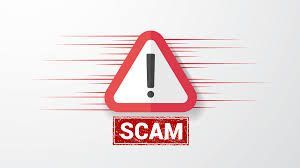No Matter Your Age, Scammers Can Catch You by Surprise

I found this in Seniors Today and thought it very blog-worthy. It comes straight from our very own Sheriff Chitwood and with all the scams going on everyday I also deem it appropriate. I hope it makes you realize you are not alone if you have succumbed to these scammers out there and makes you understand just how good they are and how aware you must be each day. NEVER give your information to anyone. Should you receive such a call, hang up, call your bank and ask them!
This week, an unfortunate soul in west Volusia contacted the Sheriff’s Office to report being a victim of fraud: He’d received a phone call from his bank alerting him that someone had used his bank card for a $300 purchase.
The caller stated he worked at Wells Fargo Bank, our victim's bank. The caller assured him the bank would handle the fraudulent charges. First, they asked for the victim's personal bank information and full access to his phone settings.
He provided all the financial information a scammer would need to help himself to our victim's bank accounts. At the urging of the caller, our victim, who is in his early 20s, transferred a large sum from his checking account to another account. He promptly observed it disappearing from that account.
Our victim's next call was to his bank, to ask about the teller he spoke to, and learned the bank had not contacted him and was unaware of his missing money.
The victim wants to pursue criminal charges and we have an active investigation under way.
Unfortunately, this kind of scam happens regularly to people of all ages here in Volusia County. Some people have lost thousands of dollars, believing they're receiving a legitimate call from their banking institution. So, they follow directions until they realize they've been had.
We all need to educate ourselves and be vigilant, to avoid falling for these kinds of schemes that keep happening.
Tips: Here are some basic tips to avoid becoming a scam victim:
If you don't recognize the caller's number, don't answer it. They can leave a message if it's important. If they don't, you probably escaped a potential scam.
Never give out your financial or personal information over the phone-such as your birthday, Social Security number, bank account numbers, and more. Even or especially to someone who claims they're calling from your bank. They're likely an imposter. If you fear there might be a problem with your account, go to your bank in person. Check your accounts online yourself. If you're not sure, run it by someone you trust. Or our non-emergency dispatch number: 386.248.1777. Or 911 in an emergency.
Don't be rushed into making a mistake by someone who could be a scammer. Think before you act. This could be a scam. Don't fall for it.
Signs to watch for:
Have you received:
• Unsolicited calls or emails.
• High-pressure tactics or offers that seem too good to be true.
• Threats of loss or risk if you don't take immediate action, even including arrest.
• Requests for immediate payment by wire transfer, credit, prepaid debt, or especially gift cards.
Florida Attorney General Ashley Moody's website myfloridalegal.com features helpful programs with information about common scams. One program is Scams At A Glance and includes downloadable brochures in English and Spanish to teach consumers how to avoid becoming a fraud victim. The other program is Consumer Alert. To view recent Consumer Alerts, visit: My FloridaLegal.com/ConsumerAlert
It's easy to fall victim to scams like we've described, but you don't have to! If you're unsure, ask a trusted friend or family member, or call the Sheriff's Office at 386.248.1777 or 911 in an emergency. We're always glad to help.
Please stay savvy and stay safe,
Sheriff Mike Chitwood



